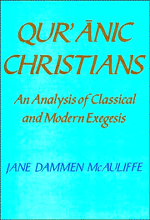Conclusion
Published online by Cambridge University Press: 24 February 2010
Summary
Completing the close textual analysis of these seven verse groups now permits the reassertion of a more comprehensive perspective. Broadly considered, persistent patterns and themes emerge, allowing these passages to intersect at several hermeneutical levels. Prominent among such patterns stands the sheer proliferation of categories. These verses continuously classify and catalogue humankind. The typologies merge and overlap, moving from formal religious designations (Jews, Christians, Ṣābiʾūn, Majūs) to particularization within one of those groups, such as Christian priests and monks. Formal designation then shades into less clearly defined but nevertheless descriptive phrases such as those who follow you [Jesus], those to whom We gave the book before, and the idolaters. Positive and negative moral categorization pits the ones specified as a balanced people and those who testify against the evildoers and the sinners. But the overriding classification remains the great divide between those who believe (or whoever believes in God and the Last Day) and those who disbelieve. Consistently people are grouped, pervasively they are catalogued on dogmatic, on moral, on religio-sociological grounds.
Within these convergent systems of classification appears an enduring pattern of praise. Specific qualities are honored and extolled. Those intended are lauded for being submissive before God, for being respectful of His revelation (they do not sell the verses of God for a small price), for being steadfast (they have persisted). Their hearts hold compassion and mercy, they are not arrogant but turn away from [idle chatter]. They recognized … the truth and turn back evil as qualities of heart and mind find expression in praiseworthy action.
- Type
- Chapter
- Information
- Qur'anic ChristiansAn Analysis of Classical and Modern Exegesis, pp. 285 - 292Publisher: Cambridge University PressPrint publication year: 1991



